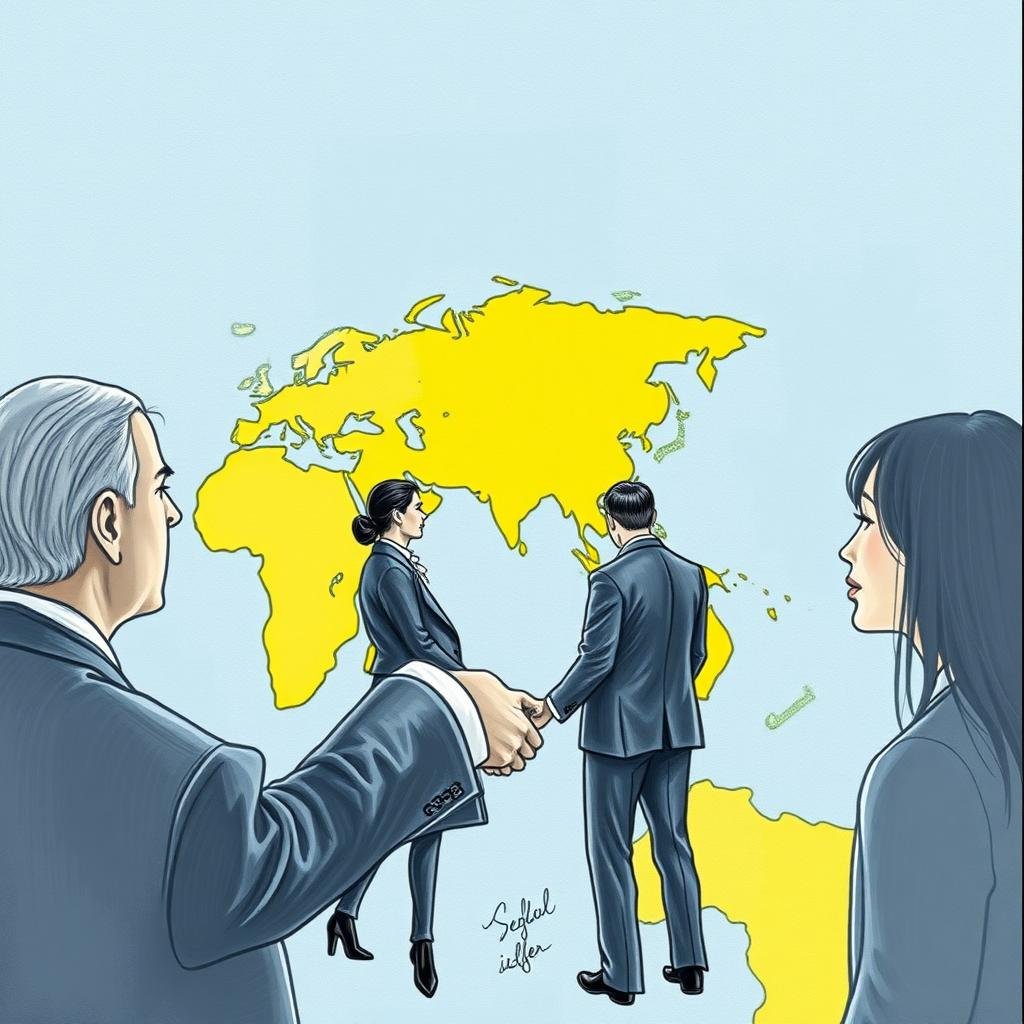Non-Western Dispute Resolution Mechanisms
The Erosion of Western Legal Hegemony: Examining Non-Western Dispute Resolution Mechanisms
The international legal order, traditionally dominated by Western legal principles and institutions, is facing unprecedented challenges. The rise of alternative dispute resolution (ADR) mechanisms rooted in non-Western cultures and traditions signals a potential shift in the landscape of global justice.
This burgeoning trend isn't merely a supplementary development; it represents a fundamental questioning of the universal applicability and perceived neutrality of Western legal frameworks. As nations assert their sovereignty and seek solutions that resonate with their unique cultural contexts, understanding these non-Western mechanisms becomes paramount.
The failure to acknowledge and integrate these approaches risks further fragmentation of international cooperation and the marginalization of significant segments of the global population. This article delves into the historical context, current state, future implications, global perspectives, and Non-Western Dispute Resolution Mechanisms analyses surrounding non-Western dispute resolution, aiming to provide a comprehensive understanding of this increasingly vital area.
Why should people care? Because the future of international relations, trade, and even peacebuilding hinges on the ability to navigate a world where Western legal systems are no longer the sole arbiters of justice.
The rise of China, India, and other non-Western powers, coupled with a growing disillusionment with the perceived biases and inefficiencies of Western institutions, fuels the demand for culturally appropriate dispute resolution. For instance, the Belt and Road Initiative (BRI), a massive infrastructure project spanning numerous countries, has highlighted the need for dispute resolution mechanisms that are acceptable to all parties involved, often requiring a departure from traditional Western legal models.
The increasing instances of international arbitration conducted under the auspices of the Shanghai International Arbitration Centre, bypassing traditional Western arbitration hubs, demonstrates a tangible shift.
Similarly, the resurgence of traditional restorative justice practices in various African nations highlights a move towards community-based solutions that prioritize reconciliation over punitive measures.
These are not isolated incidents but rather symptoms of a deeper trend, one that demands careful examination and understanding.
Historical Context: Seeds of Divergence
The current state of affairs in international law and dispute resolution cannot be understood without examining its historical roots.The dominance of Western legal principles is inextricably linked to colonialism, the rise of the modern nation-state, and the development of international institutions following World War II. However, the imposition of Western legal systems on diverse cultures and societies Non-Western Dispute Resolution Mechanisms disregarded pre-existing traditions and norms, creating a legacy of resentment and a desire for alternative approaches. Non-Western Dispute Resolution Mechanisms and the Imposition of Western Legal Systems Colonialism played a pivotal role in shaping the global legal landscape.
European powers exported their legal systems to colonized territories, often displacing indigenous legal traditions. Non-Western Dispute Resolution Mechanisms process not only asserted political control but also Non-Western Dispute Resolution Mechanisms to fundamentally alter the social and economic structures of colonized societies.
The consequences of this imposition are still felt today, with many former colonies struggling Non-Western Dispute Resolution Mechanisms reconcile Western legal frameworks with their own cultural values and practices.
For example, in many African nations, customary law, which governs matters such as land ownership, marriage, and inheritance, continues to operate alongside formal legal systems, often creating conflicts and ambiguities. The legacy of colonial legal systems has also contributed to a sense of alienation and a lack of trust in institutions perceived as being imposed from the outside.
The creation of the International Court of Justice (ICJ) in the aftermath of World War II, while intended to promote international peace and security through legal means, was largely shaped by Western legal traditions. The composition of the ICJ's judges, the procedures it employs, and the substantive law it applies all reflect a Western legal bias, leading to concerns about its neutrality and impartiality. [Link to ICJ Statute and historical analyses of its formation].
The Rise of the Nation-State and Western Legal Centralization
The rise of the nation-state in Europe further solidified the dominance of Western legal principles.The concept of sovereignty, central to the modern international legal system, originated in Western political thought. As nation-states consolidated their power, they sought to standardize legal systems within their Non-Western Dispute Resolution Mechanisms, often suppressing regional variations and customary practices. This process of legal centralization reinforced the notion that law is a product of the state and that legal authority ultimately resides in the state.
The Non-Western Dispute Resolution Mechanisms of Westphalia in 1648, which established the modern system of nation-states, also laid the groundwork for a legal order based on the principles of state sovereignty and non-interference in internal affairs. However, these principles were often selectively applied, particularly in the context of colonialism, where Western powers routinely intervened in the affairs of non-Western states under the guise of "civilizing missions." [Link to academic analyses of the Treaty of Westphalia and its impact on international law].
Post-World War II International Institutions and Western Legal Dominance
The establishment of international institutions such as the United Nations, the World Bank, and the International Monetary Fund after World War II further entrenched the dominance of Western legal principles. While these institutions were intended to promote global cooperation and development, their structures and operations were heavily influenced by Western powers.The legal frameworks governing these institutions, including their dispute resolution mechanisms, reflected Western legal norms and values. The Bretton Woods institutions, in particular, were criticized for imposing economic policies on developing countries that were often at odds with their own development priorities. The World Bank's investment arbitration mechanism, the Non-Western Dispute Resolution Mechanisms Centre for Settlement of Investment Disputes (ICSID), has been accused of favoring the interests of multinational corporations over those of host states, leading to concerns about its fairness and impartiality.
[Link to critiques of the Bretton Woods institutions and ICSID].
The Bandung Conference and Early Seeds of Resistance
The Bandung Conference of 1955, a gathering of newly independent Asian and African states, marked an early expression of resistance to Western legal and political hegemony. Non-Western Dispute Resolution Mechanisms conference participants articulated a vision of international cooperation based on the principles of sovereignty, non-interference, and mutual respect.The Bandung Conference laid the groundwork for the Non-Aligned Movement, which sought to create a space for developing countries to pursue their own interests independent of the Cold War superpowers. The conference also highlighted the importance of cultural and economic cooperation among developing countries, recognizing that genuine independence required more than just political liberation. The principles of the Bandung Conference continue to resonate today, inspiring movements for greater South-South cooperation and a more equitable international order.
[Link to historical accounts and analyses of the Bandung Conference].
Current State of Affairs: A Multifaceted Challenge to Western Legal Supremacy
The dominance of Western legal frameworks in international dispute resolution is facing increasing scrutiny and challenge. Several factors contribute to this trend, including the rise of non-Western powers, growing disillusionment with the perceived biases of Western institutions, and a renewed emphasis Non-Western Dispute Resolution Mechanisms cultural identity and sovereignty.The emergence of alternative dispute resolution mechanisms rooted in non-Western traditions reflects a desire for solutions that are more culturally appropriate, accessible, and effective.
The Rise of Non-Western Economic and Political Power
The rise of Non-Western Dispute Resolution Mechanisms, India, and other non-Western economies has significantly altered the global power balance.These countries are increasingly asserting their influence in international affairs, including in the legal realm. Their growing economic clout allows them to challenge Western dominance in trade, investment, and other areas.
The Belt and Road Initiative (BRI), a massive infrastructure project spearheaded by China, is a prime example of this trend. The BRI involves numerous countries and necessitates dispute resolution mechanisms that are acceptable to all parties involved. China has been actively promoting its own arbitration centers, such as the Shanghai International Non-Western Dispute Resolution Mechanisms Centre, as alternatives to traditional Western hubs like London and New York.
The increasing use of Chinese arbitration centers reflects a growing confidence in China's legal system and a desire to avoid the perceived biases of Western institutions. Furthermore, the establishment of institutions like the Asian Infrastructure Investment Bank (AIIB), as an alternative to the World Bank, highlights a broader trend of challenging Western hegemony Non-Western Dispute Resolution Mechanisms international finance and development. [Link to reports on the Belt and Road Initiative and the Shanghai International Arbitration Centre].
Growing Disillusionment with Western Legal Institutions
There is a growing perception that Western legal institutions are biased, Non-Western Dispute Resolution Mechanisms, and ineffective.Many developing countries feel that these institutions are designed to serve the interests of Non-Western Dispute Resolution Mechanisms powers and multinational corporations, rather than the interests of the global community as a Non-Western Dispute Resolution Mechanisms. The International Criminal Court (ICC), for example, has been criticized for disproportionately focusing on cases involving African countries, leading to accusations of selective justice.
The high cost of international Non-Western Dispute Resolution Mechanisms, the complexity of its procedures, and the lack of transparency are also major concerns. Many small and medium-sized enterprises (SMEs) in developing countries are unable to afford the cost of international arbitration, effectively denying them access to justice. Moreover, the perceived lack of diversity among arbitrators and judges in Western institutions raises questions about their impartiality.
The push for greater diversity and inclusivity in international legal institutions is gaining momentum, reflecting a broader demand for a more equitable and representative global legal order. [Link to critiques of the International Criminal Court and discussions on diversity in international arbitration].
Revival of Traditional Dispute Resolution Mechanisms
In many non-Western societies, there is a renewed interest in traditional dispute resolution mechanisms.These mechanisms are often rooted in Non-Western Dispute Resolution Mechanisms customs, values, and social structures. They typically emphasize reconciliation, mediation, and community involvement, rather than adversarial litigation.
In Africa, for example, traditional methods of dispute resolution, such as "ubuntu" in South Africa and "gacaca" in Rwanda, are being used to address conflicts and promote reconciliation.
"Ubuntu" emphasizes the interconnectedness of humanity and the importance of resolving disputes through dialogue and consensus. "Gacaca" courts, established after the Rwandan genocide, aimed Non-Western Dispute Resolution Mechanisms provide a more accessible and culturally appropriate form of justice than traditional criminal trials. In many indigenous communities around the world, elders and Non-Western Dispute Resolution Mechanisms leaders play a central role in resolving disputes and maintaining social harmony.
The revival of traditional dispute resolution mechanisms reflects a desire to reclaim cultural identity and autonomy, and to find solutions that are more responsive to local needs and values.
[Link to academic research on ubuntu and gacaca courts].
Hybrid Approaches and the Integration of Customary Law
Recognizing the limitations of both Western legal frameworks and Non-Western Dispute Resolution Mechanisms dispute resolution mechanisms, many countries are exploring hybrid approaches that integrate elements of both.This involves incorporating customary law into formal legal systems, recognizing traditional authorities, and adapting Western procedures to local contexts. In Non-Western Dispute Resolution Mechanisms Pacific Island nations, for example, customary land tenure systems are recognized Non-Western Dispute Resolution Mechanisms formal land laws, reflecting a hybrid approach to land governance. In some countries, traditional leaders are given formal Non-Western Dispute Resolution Mechanisms in the justice system, allowing them to participate in dispute resolution and law enforcement.
The integration of customary law into formal legal systems is not without its challenges, however. It requires careful consideration of potential conflicts between customary norms and human rights principles, as well as the need to ensure that customary law is applied in a fair and equitable manner.
Despite these challenges, hybrid approaches offer a promising way to bridge the gap between Western legal frameworks and local traditions, and to create more culturally appropriate and effective justice systems. [Link to studies on hybrid legal systems and the integration of customary law].
Specific Examples of Non-Western Dispute Resolution Mechanisms:
This tradition has been incorporated into the modern legal system, with mediation being widely used in both civil and commercial cases. The emphasis on mediation reflects a cultural preference for avoiding adversarial litigation and maintaining social harmony.
[Link to resources on China's mediation system].
[Link to information on Lok Adalats in India].
[Link to academic analyses of the Gacaca courts].
Their authority is often based on traditional knowledge, cultural values, and community respect. [Link to studies on indigenous dispute resolution mechanisms].
Implications for the Future: A Contested Non-Western Dispute Resolution Mechanisms Order
The growing challenge to Western legal dominance has significant implications for the future of international law and dispute resolution.As non-Western powers continue to rise and alternative dispute resolution mechanisms gain traction, the international legal order is likely to become more fragmented and contested. This could lead to both challenges and opportunities, requiring a re-evaluation of existing norms and institutions and a greater emphasis on cultural sensitivity and inclusivity.
Geopolitical Implications: A Multipolar Legal World
The rise of non-Western powers is transforming the geopolitical landscape, and this transformation is inevitably affecting the legal realm. A multipolar legal world is emerging, in which Western legal principles are no longer the sole determinant of international norms and standards. This could lead to greater competition among different legal systems, as countries seek to promote their own legal values and interests.The Belt and Road Initiative, for example, could lead to the development of a parallel legal order centered on China, challenging the dominance of Western legal hubs. The increasing assertiveness of countries like Russia and Iran in international affairs also suggests a growing willingness to challenge Western legal norms and institutions.
The emergence of a multipolar legal world could create new opportunities for cooperation and innovation, but it could also lead to greater conflict and instability. [Link to analyses of the geopolitical implications of the rise of non-Western powers].
Economic Implications: Shifting Trade and Investment Patterns
The shift in the global economic landscape is also impacting international dispute resolution. As non-Western economies become more important, trade and investment patterns are shifting, leading to a greater need for dispute resolution mechanisms that are acceptable to all parties involved.The increasing use of Chinese Non-Western Dispute Resolution Mechanisms centers, for example, reflects a growing demand for dispute resolution services that are tailored to the needs of businesses operating in China. The growth of Islamic finance is also creating a need for specialized dispute resolution mechanisms that are compliant with Sharia law. The competition among different legal systems could lead to greater innovation and efficiency, as countries seek to attract foreign investment by offering attractive dispute resolution options.
However, it could also lead to regulatory arbitrage and a race to the bottom, as countries lower their legal standards in an effort to gain a competitive advantage. [Link to reports on the economic implications of the rise of non-Western economies].
Social Implications: Cultural Sensitivity and Inclusivity
The growing emphasis on non-Western dispute resolution mechanisms reflects a broader demand for cultural sensitivity and inclusivity in international law.Many developing countries feel that Western legal norms and institutions are insensitive to their cultural values and traditions. The revival of traditional dispute resolution mechanisms reflects a desire to reclaim cultural identity and autonomy, and to find solutions that are more responsive to local needs and values. The integration of customary law into formal legal systems can help to bridge the gap between Western legal frameworks and local traditions, creating more culturally appropriate and effective justice systems.
However, it is important to ensure that the application of customary law is consistent with human rights principles and that vulnerable groups are protected Non-Western Dispute Resolution Mechanisms discrimination.
The challenge is to create a legal order that is both universal and culturally sensitive, respecting the diversity of human cultures while upholding fundamental principles of justice and fairness.
[Link to research on cultural sensitivity and inclusivity in international law].
Potential Non-Western Dispute Resolution Mechanisms and Non-Western Dispute Resolution Mechanisms Forecasts:
Different regions and countries develop their own legal systems and dispute resolution mechanisms, leading to greater complexity and uncertainty in international relations.
This could lead to greater conflict and instability, as non-Western Non-Western Dispute Resolution Mechanisms resist Western hegemony.
Others foresee a more fragmented legal order, with different regions and countries Non-Western Dispute Resolution Mechanisms their own legal paths. The key challenge will be to manage this transition in a way that promotes peace, stability, and justice for all.
[Link to expert analyses on the future of international law].
Challenges and Opportunities:
* Difficulty in ensuring consistency with human rights principles.
* A more equitable and just international legal order.
Global Perspectives: A Kaleidoscope of Approaches
The Non-Western Dispute Resolution Mechanisms to the challenge of Western legal dominance varies significantly across different regions and countries. Some countries are actively promoting alternative dispute resolution mechanisms rooted in their own cultural Non-Western Dispute Resolution Mechanisms, while others are seeking to integrate Non-Western Dispute Resolution Mechanisms law into formal legal systems.Still others are adhering to Western legal frameworks, while advocating for reforms to make them more inclusive and representative.
China: A New Legal Order?
China's Non-Western Dispute Resolution Mechanisms as a global economic and political power has significant implications for international law and dispute resolution.China has been actively promoting its own arbitration centers, such as the Shanghai International Arbitration Centre, as alternatives to Western hubs. The Belt and Road Initiative (BRI) necessitates dispute resolution mechanisms that are acceptable to all parties involved, and China is seeking to play a leading role in shaping these mechanisms.
China's approach to Non-Western Dispute Resolution Mechanisms law is often characterized by an emphasis Non-Western Dispute Resolution Mechanisms state sovereignty, non-interference, and mutual respect. China has also been promoting the concept of "win-win" cooperation, suggesting that international law should be used to promote shared interests rather than impose Western values.
However, China's human rights record and its approach to territorial disputes in the South China Sea have raised concerns about its commitment to international law. [Link to reports on China's approach to international law and dispute Non-Western Dispute Resolution Mechanisms.
India: Balancing Tradition and Modernity
India, with its diverse cultural traditions and complex legal system, presents a unique perspective on international dispute resolution.India has a long Non-Western Dispute Resolution Mechanisms of mediation and conciliation, which is reflected in the popularity of Lok Adalats, or "People's Courts." India is also home to a variety of religious and customary legal systems, which are often recognized alongside formal Non-Western Dispute Resolution Mechanisms systems. India's approach to international law is often characterized by a commitment to multilateralism and the principles of the UN Charter.
India has also been a strong advocate for the rights of developing countries and for a more equitable international order. However, India faces significant challenges in implementing international law domestically, due to its vast population, complex legal system, and persistent poverty. [Link to studies on India's legal system and its approach to international law].
Africa: Reclaiming Cultural Identity
Many African countries are seeking to reclaim their cultural identity and autonomy in the legal realm.Traditional dispute resolution mechanisms, such as Non-Western Dispute Resolution Mechanisms in South Africa and gacaca in Rwanda, are being used to address conflicts and promote reconciliation. The African Union has also been promoting the development of regional legal frameworks that are Non-Western Dispute Resolution Mechanisms to the specific needs and values of African countries.
However, African countries face significant challenges in strengthening their legal systems, due to limited resources, weak institutions, and persistent corruption.
The legacy of colonialism and the imposition of Western legal systems have also created a sense of alienation and a lack of trust in formal legal institutions. [Link to reports on legal reform and dispute resolution in Africa].
Latin America: A History of Resistance
Latin America has a long history of resistance to Western legal and political dominance.The region has been a pioneer in the development of alternative legal theories, such as dependency theory and critical legal studies, which challenge the assumptions of Western legal thought. Latin American countries have also been active in promoting regional integration and the development of regional legal frameworks. However, Latin America faces significant challenges in consolidating its democratic institutions and strengthening the rule of law. The region has been plagued by political instability, corruption, and violence, which undermine the effectiveness of its legal systems.
[Link to analyses of Latin American legal systems and their approach to international law].
The Middle East: Navigating Religious and Cultural Norms
The Middle East Non-Western Dispute Resolution Mechanisms a unique set of challenges and opportunities in the field of international dispute resolution. The region is home to a variety of religious and cultural traditions, which influence its approach to law and justice.Islamic finance, for example, has led to the development of specialized dispute resolution mechanisms that are compliant with Sharia law. However, the Middle East also faces significant challenges due to political instability, armed conflict, and human rights abuses. The region has been the site of numerous international interventions, which Non-Western Dispute Resolution Mechanisms further complicated its legal landscape. [Link to studies on legal systems and dispute resolution in the Middle East].
Analysis and Criticism: Unpacking the Complexities
The rise of non-Western dispute resolution mechanisms is a complex and multifaceted phenomenon that has generated significant debate and controversy. There are a variety of perspectives on the issue, ranging from those who see it as a positive development that Non-Western Dispute Resolution Mechanisms cultural diversity and inclusivity to those who view it as a threat to the universality of international law and human rights.Arguments in Favor of Non-Western Dispute Resolution:
Arguments Against Non-Western Dispute Resolution:
Addressing Potential Biases and Limitations:
This requires careful monitoring and evaluation of these mechanisms, as well as the development of safeguards to protect vulnerable groups from discrimination and abuse.
Areas for Further Exploration:
Conclusion: Towards a More Inclusive and Equitable Legal Order
The rise of non-Western dispute resolution mechanisms signals a profound shift in the landscape of international law and dispute resolution.It reflects a growing demand for cultural sensitivity, inclusivity, and equity in the global legal order. While there are legitimate concerns about human rights and the potential for abuse, these challenges can be addressed through careful monitoring, evaluation, and the development of appropriate safeguards. The key takeaway is that the future of international law hinges on its ability to adapt to a multipolar world and to accommodate the diverse legal traditions and cultural values of different societies.
This requires a willingness to engage in dialogue, to learn from each other, and to develop legal frameworks that are both universal and culturally sensitive. Moving forward, several steps could be taken to promote a more inclusive and equitable legal order:
This requires a commitment to dialogue, Non-Western Dispute Resolution Mechanisms, and Non-Western Dispute Resolution Mechanisms willingness to challenge existing power structures and legal Non-Western Dispute Resolution Mechanisms. The future of international law depends on our ability to create a more inclusive and equitable world for all.







Top comments (0)